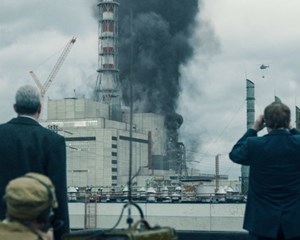We hoped they would be able to evaluate the situation quickly, but for the first couple days, they weren't able to tell us anything.
我們冀望他們能迅速評(píng)估狀況 但是開(kāi)始前幾天他們無(wú)法提出任何報(bào)告
It was a dramatic situation. We'd be in session, waiting for information.
這是非常驚人的狀況 我們召開(kāi)集會(huì)等待資訊
We were demanding information, but they weren't able to tell us anything.
我們要求他們提出報(bào)告 但他們無(wú)法告知任何資訊
Twenty hours after the explosion, the level of radioactivity continues to climb.
距離爆炸20小時(shí)后 放射量依然繼續(xù)攀升
By now windows and doors should be sealed and iodines tablets swallowed to counteract the effects of radioactivity. Yet no such orders have been given.
如今門(mén)窗都應(yīng)該密封 并且食用碘片以中和放射性 但是政府并沒(méi)有發(fā)布類似命令
Despite rising tensions in the city, the population has still not been informed of the situation.
城市中的情勢(shì)雖然升高 居民依然沒(méi)有被告知整個(gè)情況
Yulia Martchenko was only five at the time. She lived in Pripyat with her family.
尤莉亞瑪琪可當(dāng)時(shí)只有5歲 她與家人同住在普里皮亞季
Her father worked at the plant. My parents took me to the day care center like usual. Everything was absolutely normal.
他父親在核電廠工作 我父母照常帶我到托兒所 一切都很正常

My father already knew there'd been an accident, but no precautions had been taken yet.
父親已經(jīng)知道有事故發(fā)生 但是并沒(méi)有采取任何防護(hù)措施
30 hours after the explosion, the first security measures are enforced.
爆炸發(fā)生后30小時(shí)終于開(kāi)始采取第一批安全措施
More than 1000 buses have arrived At 2pm the army announced in the city is completely evacuated. I remember the teachers at the kindergarten gave us iodine pills.
超過(guò)1000部巴士抵達(dá)該市 下午兩點(diǎn)軍方宣布將徹底疏散該城 我記得幼稚園的老師給我們吃碘片
Then parents came to pick up their kids. Everyone was running around but they weren't panicking.
然后父母親前來(lái)接孩子 大家都跑來(lái)跑去但是并不慌張
We thought we were only gone for three days. To avoid any panic the authorities concealed the seriousness of the situation.
我們以為頂多離開(kāi)3天而已 為避免引發(fā)驚慌 當(dāng)局隱瞞了情況的嚴(yán)重性
Inhabitants are given two hours to gather their belongings and assemble in front of their buildings.
居民只有2小時(shí)可以打包 然后就要在自家建筑前面集合
They told us to get in the buses. I remember perfectly well having to choose which toys I was want to take.
他們要我們上巴士 我清楚記得我得挑選要帶走的玩具
I had a lot of dolls and wanted to bring them all, but I couldn't. We couldn't even take any warm clothes.
我有很多洋娃娃我想全部帶走卻不行 我們甚至來(lái)不及帶保暖衣物
People have to leave everything they own, their entire lives, behind. They will never return.
居民必須丟下?lián)碛械囊磺?還有全部的生活 他們?cè)僖矝](méi)回去過(guò)
One old man didn't want to go. He stayed behind. They found his body a few weeks later.
有個(gè)老人不想走 他留下來(lái)了 幾周后人們發(fā)現(xiàn)了他的尸體











